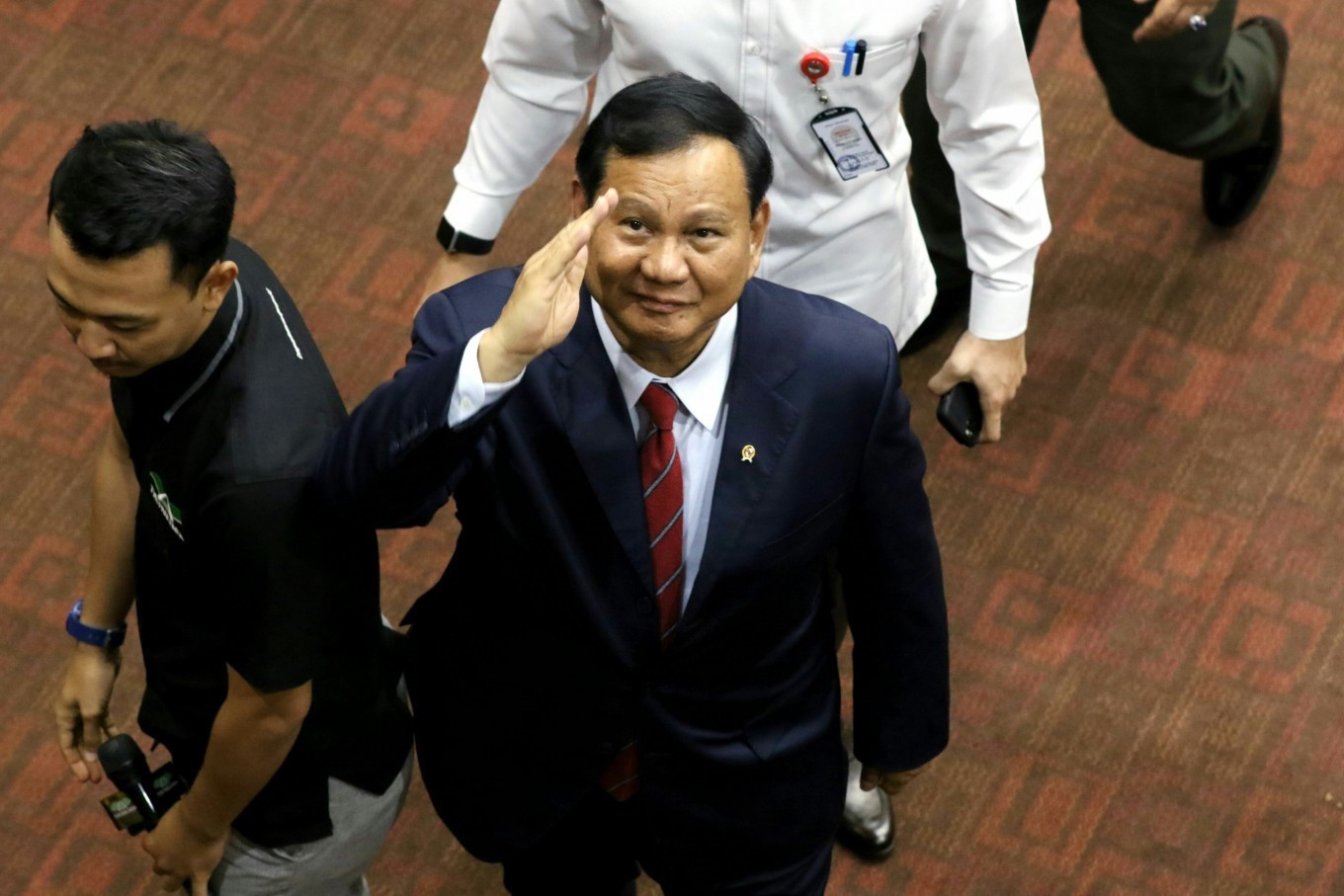Popular Reads
Top Results
Can't find what you're looking for?
View all search resultsPopular Reads
Top Results
Can't find what you're looking for?
View all search resultsAnalysis: Prabowo to increase tax ratio, state budget deficit
Change text size
Gift Premium Articles
to Anyone
 Defense Minister Prabowo Subianto attended the inaugural working meeting with the DPR's Commission I at the Senayan Parliament Complex, Jakarta, Monday (11/11/2019). A working meeting between the DPR and the Ministry of Defense (Kemhan) discussed the 2020 Ministry of Defense work plan and its budget support. (JP/Dhoni Setiawan)
Defense Minister Prabowo Subianto attended the inaugural working meeting with the DPR's Commission I at the Senayan Parliament Complex, Jakarta, Monday (11/11/2019). A working meeting between the DPR and the Ministry of Defense (Kemhan) discussed the 2020 Ministry of Defense work plan and its budget support. (JP/Dhoni Setiawan)
D
efense minister and presumptive president-elect Prabowo Subianto attended the Mandiri Investment Forum 2024 as keynote speaker last week, a role that would normally be performed by President Joko “Jokowi” Widodo. The keynote speech that ran for over an hour, discussed a litany of topics, ranging from the messiness of democracy in Indonesia to the country’s extremely low tax ratio and the low contribution of government spending to GDP.
The stance of defense minister Prabowo towards expanding the tax ratio comes to no surprise as that was one of his stated goals during his presidential campaign. Should the defense minister become president, he plans to launch expansive free lunch and milk programs followed with policy-led initiatives to reach food, water and energy self-sufficiency, an expansion to universal healthcare services and more. Each of these programs would require a massive budget, but altogether it would demand a complete revamp of the state budget’s revenue stream and cash flow.
Nevertheless, OECD data backs the statement that Indonesia has an extremely low tax ratio. In 2021, Indonesia had one of the lowest tax ratios in Southeast Asia at 10.87 percent. In comparison, other prominent Southeast Asian economies such as Thailand and the Phillipines had tax rates of 16.41 and 18.06 percent respectively in the same period.
This low tax ratio means that the government’s capacity to perform its duties is poor in comparison to the relative size of the country’s economy, which is reflected in government spending contribution to GDP. Defense minister prabowo mentions in his speech that Indonesia’s government expenditure to GDP ratio is one of the lowest in the world, only 15.5 percent.
While the current administration has started launching a number of initiatives to boost the tax ratio, such as the harmonized tax (HPP) law, defense minister Prabowo unveiled a proposal in his keynote speech to increase the limit for state budget deficit above 3 percent, an announcement that went viral.
Indonesia had been maintaining a budget deficit below 3 percent since even before President Jokowi took office to ensure that debts and accrued interests payable remain manageable. The budget deficit limit was raised temporarily during the COVID-19 pandemic era, due to the drop in economic productivity, requiring fiscal policies to stabilize the economy. Meanwhile, bringing Indonesia’s budget deficit for 2023 down to 2.84 percent, from 3.92 percent in 2022 and 4.57 percent in 2021 respectively, was a considerable achievement.
As a natural result of keeping accrued debt under control, Indonesia also has one of the lowest debt to GDP ratios in the world, reaching only 38.6 percent by the end of 2023. Even throughout the pandemic period that devastated many countries with accrued debt, Indonesia’s debt to GDP ratio peaked at 41 percent in 2021 during the pandemic, still far below the safe limit of 60 percent debt to GDP ratio stipulated in Law no. 17/2003 on national finance.


















